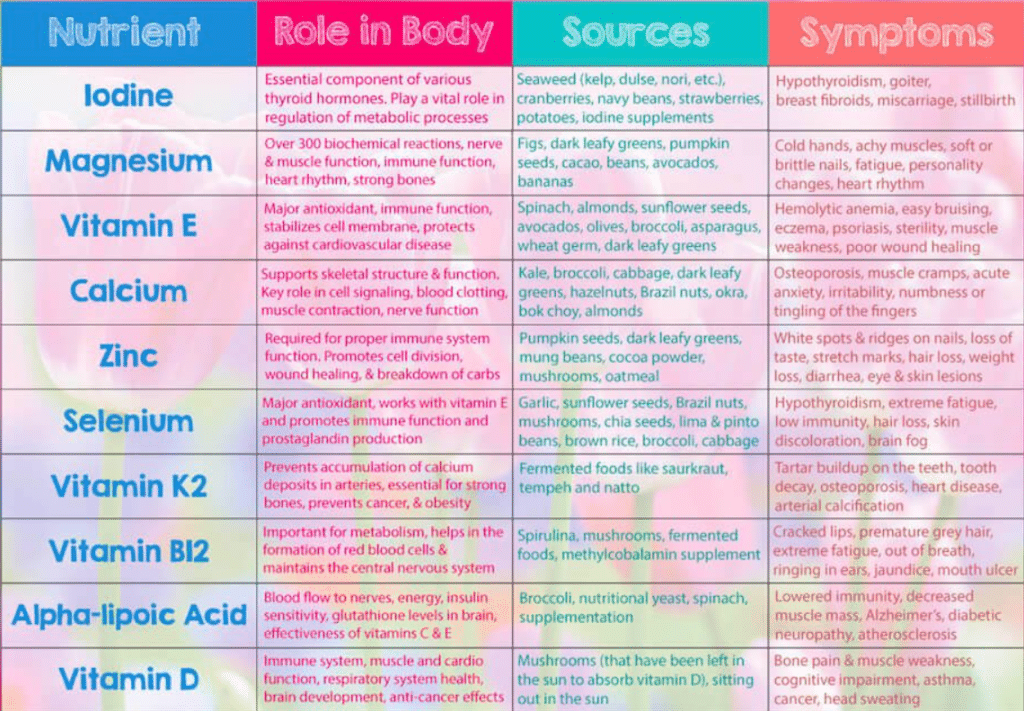In today’s fast-paced world, ensuring optimal nutrition can sometimes feel like navigating a complex labyrinth. With the rise of processed foods and busy lifestyles, common nutritional deficiencies are more prevalent than ever, impacting people’s health in myriad ways. This comprehensive guide delves into overcoming these deficiencies, ensuring readers have the knowledge to foster better health. From identifying key deficiencies to implementing practical solutions, this article serves as a beacon for those aiming to improve their nutritional status and, by extension, their overall well-being.
Contents
- 1 Identifying Common Nutritional Deficiencies
- 2 The Role of Diet in Preventing Nutritional Deficiencies
- 3 Supplements: When Diet Is Not Enough
- 4 The Impact of Lifestyle on Nutrient Absorption
- 5 Addressing Nutritional Deficiencies in Special Populations
- 6 The Role of Technology in Managing Nutritional Health
- 7 Success Stories: Overcoming Nutritional Deficiencies
- 8 Moving Forward: Maintaining Nutritional Health
- 9 The Bottom Line
Identifying Common Nutritional Deficiencies

Recognizing the signs of nutritional deficiencies is the first step toward correction. For instance, vitamin D, iron, calcium, and Vitamin B12 deficiencies can lead to significant health issues, including bone demineralization, fatigue, impaired immunity, and neurological complications. These deficiencies often present subtly, manifesting as general tiredness, mood changes, and diminished cognitive function, making them easy to overlook in their early stages. Early detection through symptom recognition is paramount for timely intervention.
However, self-diagnosis and treatment can be precarious. Blood tests and professional evaluations are crucial for accurately pinpointing deficiencies. This accuracy prevents the misdirection of treatment efforts and ensures that individuals receive the most appropriate intervention. By relying on professional guidance, individuals can embark on the path to recovery confidently, ensuring that their efforts to address deficiencies are safe and effective.
The Role of Diet in Preventing Nutritional Deficiencies

A well-rounded diet is the cornerstone of preventing nutritional deficiencies. Consuming various foods rich in vitamins, minerals, and other essential nutrients lays the foundation for robust health. This dietary diversity is a natural safeguard against the common pitfalls of a nutrient-sparse diet, offering a spectrum of benefits that extend well beyond preventing deficiencies.
Incorporating nutrient-dense foods into one’s diet is simpler than it might seem. Leafy greens, nuts, seeds, lean meats, and whole grains are some foods that pack a nutritional punch. Dietary planning and consultations with nutrition professionals can provide personalized guidance for those uncertain about how to start. Tailoring one’s diet to meet individual needs ensures not only the prevention of deficiencies but also the promotion of long-term health and vitality.
Supplements: When Diet Is Not Enough

While a balanced diet is ideal for meeting nutritional needs, certain circumstances may necessitate supplementation. Individuals with specific health conditions, dietary restrictions, or absorption issues may find it challenging to obtain all necessary nutrients from food alone. In these cases, supplements can play a critical role in filling nutritional gaps and preventing deficiencies.
Choosing the right supplements, however, is not a decision to be taken lightly. Quality, dosage, and bioavailability must be considered to ensure efficacy and safety. Consulting healthcare providers before starting any supplement regimen is essential for avoiding potential interactions and side effects. With the right guidance, supplements can be a valuable tool against nutritional deficiencies.
The Impact of Lifestyle on Nutrient Absorption

Lifestyle choices profoundly impact the body’s ability to absorb and utilize nutrients. Factors such as stress, alcohol consumption, smoking, and sedentary habits can severely compromise nutrient absorption, exacerbating the risk of deficiencies. These lifestyle elements create a hostile environment for optimal nutritional health, hindering the body’s natural processes.
Addressing these lifestyle factors is crucial for improving nutrient absorption and overall health. Simple changes, such as incorporating regular exercise, reducing alcohol and tobacco use, and adopting stress management practices, can significantly enhance the body’s nutritional status. By fostering a lifestyle conducive to good health, individuals can maximize the benefits of the nutrients they consume, paving the way for a deficiency-free existence.
Addressing Nutritional Deficiencies in Special Populations

Certain groups face unique challenges in meeting their nutritional needs. Pregnant women, the elderly, vegetarians, vegans, and those with chronic illnesses often require special consideration to avoid deficiencies. For example, vegetarians and vegans may need alternative sources of vitamin B12 and iron, nutrients predominantly found in animal products.
Tailored dietary strategies are essential for these populations. Pregnant women, for instance, may benefit from increased intake of folic acid and iron, while the elderly might need more calcium and vitamin D to maintain bone health. When necessary, professional dietary planning and supplementation can help these groups overcome their specific challenges, ensuring their nutritional needs are comprehensively met.
The Role of Technology in Managing Nutritional Health

In the digital age, technology offers innovative tools for managing nutritional health. Apps and wearable devices can track nutrient intake, highlight potential deficiencies, and offer dietary recommendations. This immediate feedback allows individuals to make informed decisions about their diet and supplement use, potentially preventing nutritional gaps before they become problematic.
However, while technology can be a valuable ally in managing nutritional health, it should not replace professional advice. The data and recommendations apps and devices provide are general and may not account for individual health conditions or needs. Users should employ technology as a supplementary tool, always seeking the expertise of healthcare professionals for personalized guidance and interventions.
Success Stories: Overcoming Nutritional Deficiencies

Inspirational success stories abound of individuals who have triumphed over nutritional deficiencies. These narratives often share themes of determination, adherence to professional advice, and a willingness to make significant lifestyle and dietary changes. From overcoming iron deficiency anemia with a strategic diet and supplementation plan to reversing vitamin D deficiency through targeted sun exposure and fortified foods, these stories offer hope and practical lessons for others facing similar challenges.
Analyzing these success stories reveals key factors for overcoming nutritional deficiencies. Consistent effort, educated dietary choices, appropriate supplementation, and lifestyle modifications play pivotal roles. Moreover, the support of healthcare professionals is invaluable in guiding individuals through the process, providing a solid foundation for sustained nutritional health.
Moving Forward: Maintaining Nutritional Health

Overcoming a nutritional deficiency is significant, but maintaining that success requires ongoing vigilance and effort. Regular monitoring of nutritional status continued adherence to a balanced diet, and lifestyle adjustments are essential for preventing the recurrence of deficiencies. This proactive approach ensures the body receives all necessary nutrients for optimal functioning.
Education and awareness are also critical in maintaining nutritional health. Staying informed about the latest nutritional science, recognizing early signs of deficiencies, and understanding how lifestyle factors influence nutritional status empower individuals to take control of their health. The journey toward a deficiency-free life becomes achievable and sustainable by prioritizing nutrition and making informed choices.
The Bottom Line
Addressing common nutritional deficiencies is a multifaceted endeavor that requires awareness, education, and proactive management. From understanding the signs of deficiencies and the importance of a balanced diet to recognizing the role of supplements and lifestyle factors, overcoming nutritional challenges is within reach. By drawing inspiration from success stories and leveraging professional guidance, individuals can navigate the path to optimal nutritional health. As this comprehensive guide has outlined, the journey toward overcoming nutritional deficiencies is a testament to the power of informed choices, consistent effort, and a commitment to well-being.


